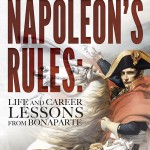First I was intrigued in Napoleon the conquering icon. Then I grew fascinated with Napoleon the flawed human being.
The result is a new nonfiction book, “Napoleon’s Rules: Life and Career Lessons from Bonaparte.”
 The book grew out of my research for my Ethan Gage adventure novels. Ethan is an American embroiled in the Napoleonic period, and Napoleon is the blazing sun around which characters and plot revolve.
The book grew out of my research for my Ethan Gage adventure novels. Ethan is an American embroiled in the Napoleonic period, and Napoleon is the blazing sun around which characters and plot revolve.
Unlike other Napoleon books, “Rules” is about YOU. Bonaparte’s dizzying ascent and plunging fall – and his many pronouncements about life – are mined for advice, or rather fifteen “rules,” each a chapter that explores an aspect of the emperor’s success or failure.
The book is deliberately provocative, brisk, and concise, about 150 pages. Included is a timeline of Bonaparte’s life and suggestions for further reading.
Napoleon had an amazing life that draws us in because he is so humanly recognizable. He was extraordinarily brilliant, frenetically ambitious, and emotionally dissatisfied.
The Corsican kid rose from nothing, always speaking French with an accent, and yet came close to mastering the world. He also didn’t know when to quit, overreached in Russia, and ultimately was crushed.
The Greeks would call it hubris and fate. Spectacular rise and fall always fascinates us, from Antony and Cleopatra to Al Pacino in “Scarface.”
I call Napoleon, “The First Modern Man.” As I assert in the book’s introduction: “He was a climber, a self-promoter, and an opportunist. He seems embarrassingly recognizable in our twenty-first century – the self-made man, the entrepreneur, the egotist, the scrambler, the poser, the wit – and thus understandable, if not entirely understood by himself.”
I don’t contend Bonaparte is the perfect role model. Rather, that he is instructive from both winning and losing. His epic career and parabolic trajectory are also a lot of fun.
The book is timely: June 18, 2015, is the 200th Anniversary of Napoleon’s final defeat at Waterloo. No one ever tried so hard, made so many comebacks, inflicted such chaos, and ended so disastrously.
At age 45 Bonaparte was a British prisoner, confined to the lonely island of St. Helena in the South Atlantic. He died at 51.
Before he did, Napoleon had a lot to say. “Napoleon’s Rules” quotes more than two hundred of his statements and maxims. The reader is not expected to agree with all of them, but they are guaranteed to make you think.
So, enjoy and learn. The book’s introduction can be read as an excerpt both on this website and on the “look inside” feature at Amazon.com.

